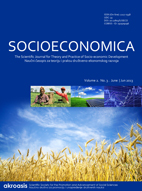Pristup ljudskim pravima na tržištima u Svetskoj trgovinskoj organizaciji, Ujedinjenim nacijama i Međunarodnoj organizaciji rada
THE HUMAN RIGHTS APPROACH TO MARKETS IN THE WORLD TRADE ORGANIZATION, UNITED NATIONS AND INTERNATIONAL LABOUR ORGANIZATION
Author(s): Mehari FissehaSubject(s): Law, Constitution, Jurisprudence
Published by: Naučno društvo za promociju i unapređenje društvenih nauka AKROASIS
Keywords: Human rights
Summary/Abstract: In the shadow of World War II’s end, unprecedented discourse regarding international human rights was birthed from knowledge regarding the gross abuses that took place and subsequent shock that the civilized world had no international legislation in place to counter similar, future atrocities. In 1948, the International Labour Organization (ILO) adopted the Freedom of Association and Protection of the Right to Organise Convention while, in the same year, the United Nations (UN) adopted the Universal Declaration of Human Rights [Swepston 1998, p.169]. The comparatively younger World Trade Organization (WTO) has been both condemned and heralded for its handling, and lack thereof, of human rights violations. In the formidable wake of globalisation, all three organizations have had to bind their human rights policies to economics, thereby enhancing the interconnectivity of the entities and, by extension, international policy. The following, critical comment explores the history and current state of UN, ILO, and WTO human rights’ approaches to market policy, affording particular attention to recommendations for amending the policies in order to foster greater cohesion and address one of the most pressing human rights issues of the twenty-first century.
Journal: Socioeconomica - Naučni časopis za teoriju i praksu društveno-ekonomskog razvoja
- Issue Year: 3/2014
- Issue No: 5
- Page Range: 173-178
- Page Count: 5
- Language: English

